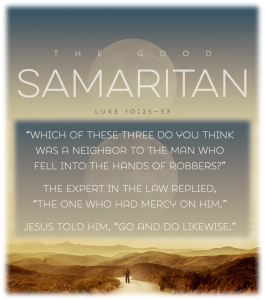LUKE 10: TACKLING STREET VIOLENCE
 Listening to the radio again this morning, news of another suicide bombing in a market place in Afghanistan catches my attention once more. Where once, people would single out and set upon, a lone traveller. Now mass killings can be “achieved” in an instant! So, what has today’s chapter, written in the 1st Century AD, got for me that will help me process “the real world” as it unfolds around me.
Listening to the radio again this morning, news of another suicide bombing in a market place in Afghanistan catches my attention once more. Where once, people would single out and set upon, a lone traveller. Now mass killings can be “achieved” in an instant! So, what has today’s chapter, written in the 1st Century AD, got for me that will help me process “the real world” as it unfolds around me.
Well, bizarrely enough, this 2,000-year-old snapshot of the Creator God’s epic drama, complied by a 1st Century doctor, has a number of things for me to unpack, and take heart in, today. Like most of the chapters that we have been reading this month, they seem to be a record of disconnected stories. They’re a recollection of what Jesus did that day or that week and, at first glance, could mean absolutely nothing to a 21st Century lady who’s typing to you on her computer.
 Yet quite the opposite, the Creator’s Word is transcendent. It’s not limited by time, generations, or the development, structure, and functioning of societies and culture. In other words, HIStory is our story and, because He’s the first and the last, the beginning and the end[a], His conclusions will, in the end, be our conclusions – whether we believe and adopt them, or not.
Yet quite the opposite, the Creator’s Word is transcendent. It’s not limited by time, generations, or the development, structure, and functioning of societies and culture. In other words, HIStory is our story and, because He’s the first and the last, the beginning and the end[a], His conclusions will, in the end, be our conclusions – whether we believe and adopt them, or not.
With that said, today’s chapter can be broken up into two parts: the story of the 70 (or 72) and the story of The Good Samaritan and, both stories are about tackling violence. Perhaps you may remember that, in my 03 March Breadcrumb, we looked at Chapter Four of Luke’s book. In it, Jesus read from the Book of Isaiah (a prophet who lived around 700BC) and applied these words to Himself…
“The Spirit of the Lord is upon Me, Because He anointed Me to preach the gospel to the poor. He has sent Me to proclaim release to the captives, And recovery of sight to the blind, To set free those who are oppressed, To proclaim the favorable year of the Lord.” [Isaiah 61:1-2]
We were originally created in God’s image to operate in His likeness – primarily seen in ruling over our environment.[b] So, today’s chapter shows examples of humans working as appropriately functioning image-bearers of the Creator God. Jesus sent out 70 (or some manuscripts say 72) in the Power of the Holy Spirit, to specifically be like Him – as Isaiah the prophet described. They were to preach “good news” to the poor; release the captives; recover sight to the blind; set the spiritually oppressed free; and proclaim the Year of the Lord’s Favour. [v1-9]
This was a head-on battle. [v3-4] They were to bring restoration to people who had spiritual and physical “battle scars” after suffering violence at the hands of the forces of darkness.[c] Now you may immediately think, “Seriously? Do people today still believe in such fairy tales?” But if you’re to believe in the Creator God, you need to believe HIStory. And, it’s clear from earliest times that a walking-talking personified evil, named “satan” (which means adversary), is active in the affairs of man.[d] So, just as surely as the Creator God exists, so too does His angels, and satan. As our Maker’s image-bearers and representatives on earth, we’re not cocooned, nor immune, to trouble coming against us. On the contrary, we’re the target! His adversary is our adversary and so we’re told:
“Be of sober spirit, be on the alert. Your adversary, the devil, prowls around like a roaring lion, seeking someone to devour.” [1 Peter 5:8]
So then, the reason for such a strong response to the communities who didn’t welcome Father God’s offer of peace and help [v10-16] was because, by their actions, they were, in effect, allowing the deterioration and destructive elements to continue. You may remember from yesterday’s Breadcrumb that Jesus said, “For he who is not against us is for us.”[e] This is as much to say that, whoever is not showing that they are “For Him” (or those displaying open opposition to His “Good news” and offers of lasting change), are against Him. If against, then an adversary under the same umbrella as satan himself. “The one who listens to you listens to Me, and the one who rejects you rejects Me; and he who rejects Me rejects the One who sent Me.” [v16]
It stands to reason then, that a joyful party breaks out when the 70 return. [v17-24] From the earliest times, the Creator God told Moses: “I will be gracious to whom I will be gracious, and will show compassion on whom I will show compassion; for I Myself will make all My goodness pass before you, and will proclaim the Name of the Lord before you….[f]
 When the Nation of Israel hit rock bottom at the worst place in HIStory (where there seemed to be no hope at all), the prophet Jeremiah said: “The Lord’s loving-kindnesses indeed never ceases, For His compassions never fail.”[g] But many of the great people in the previous 39 books that make up HIStory, would have longed to see what these 70 saw, and to experience what they had the chance of experiencing. [v23]
When the Nation of Israel hit rock bottom at the worst place in HIStory (where there seemed to be no hope at all), the prophet Jeremiah said: “The Lord’s loving-kindnesses indeed never ceases, For His compassions never fail.”[g] But many of the great people in the previous 39 books that make up HIStory, would have longed to see what these 70 saw, and to experience what they had the chance of experiencing. [v23]
 The two stories, in today’s chapter, are hinged in the middle with an all-important question. [v25-29] If there’s violence to be done (and we all know it comes in every form from insidious remarks that cut to the heart of a person, to all-out brutality), and if it can be at all fixed by “a golden rule” [v27], what does it mean to “love God” in an all-in way? Then, if humans are images of Him, what’s it mean to love our neighbour? Who is my neighbour and what does “being a neighbour” look like?
The two stories, in today’s chapter, are hinged in the middle with an all-important question. [v25-29] If there’s violence to be done (and we all know it comes in every form from insidious remarks that cut to the heart of a person, to all-out brutality), and if it can be at all fixed by “a golden rule” [v27], what does it mean to “love God” in an all-in way? Then, if humans are images of Him, what’s it mean to love our neighbour? Who is my neighbour and what does “being a neighbour” look like?
The lawyer, in today’s chapter, had been brought up in thorough training. They took the Creator’s original Guidelines, handed down by Moses, picked each rule apart, then applied it in each consecutive generation over the millennium since. Now this “teacher of the Law” was looking for a loop-hole in the Law that would lessen his need for showing compassion as broadly as his Maker does. [v29] So, in answer, Jesus tells a story about street violence…
 The first to pass by the victim of this brutal robbery, was a priest. It could be argued that it was within his remit to cross to the opposite side of the road, so as not to be “defile” by this naked, beaten “corpse”.[h] After all, from that distance, how would he know if it was not dead? The fact that Jesus used the terms “priest” for the first guy and “Levite” for the second, when all priests were Levites, suggests that the first guy could have been on duty, and possibly heading to work at the temple in Jerusalem. If so, this would be a double excuse for not going near something that clearly looked dead.
The first to pass by the victim of this brutal robbery, was a priest. It could be argued that it was within his remit to cross to the opposite side of the road, so as not to be “defile” by this naked, beaten “corpse”.[h] After all, from that distance, how would he know if it was not dead? The fact that Jesus used the terms “priest” for the first guy and “Levite” for the second, when all priests were Levites, suggests that the first guy could have been on duty, and possibly heading to work at the temple in Jerusalem. If so, this would be a double excuse for not going near something that clearly looked dead.
The Levite was a guy from the priestly line – those who weren’t given any land when the country was divided up in the days of Mosses.[i] Without land, they weren’t self-sustaining. They lived in the cities in service to God and His people – relying on offerings from the public to live. This Levite, in Jesus story, may have felt that he’d given enough. He’d already done his “good deed”, and it was well within his rights to let someone else deal with this crumpled form who may be alive. After all, he wouldn’t want to rob the next person of the blessing gained from giving them the opportunity to do a “good deed”. Whatever, the thoughts in the head of this Levite, if the victim was indeed still alive, then the victim would automatically become his responsibility. So, with limited resources, he too crossed over to the far side of the road before going on his way.
Now, if this “Teacher of the Law”, wasn’t already drawn into Jesus’ story as he processed the Laws that these two priests may have broken (or what loop-holes could be found that would justify their behaviour), Jesus pulls the pin on the hand grenade: “But a Samaritan, who was on a journey, came upon him…” This was a left hook that came out of nowhere and, it would have stunned the lawyer, freezing him in mid-thought.
 Samaritans were a mix of people who had been brought into northern Israel when the Assyrians took over.[j] Though some returning exiles went back to their allotted territories, many couldn’t show proof of their Jewish ancestry. They inter-married in time, and were therefore treated like second class citizens – whether they wanted to seek out the God of the Jews, or not. “Which of these three,” Jesus asked, “do you think proved to be a neighbour to the man who fell into the robbers’ hands?” But unable to openly admit: “the Samaritan”, the Lawyer simply responded with the Law on mercy.[k]
Samaritans were a mix of people who had been brought into northern Israel when the Assyrians took over.[j] Though some returning exiles went back to their allotted territories, many couldn’t show proof of their Jewish ancestry. They inter-married in time, and were therefore treated like second class citizens – whether they wanted to seek out the God of the Jews, or not. “Which of these three,” Jesus asked, “do you think proved to be a neighbour to the man who fell into the robbers’ hands?” But unable to openly admit: “the Samaritan”, the Lawyer simply responded with the Law on mercy.[k]
But what’s this to do with me?
I have never experienced street violence. I’ve never been caught up in the bombing of a market place, like in our current news. But there are victims out there. People are suffering every day and in every country on earth, from the intentional use of physical force, intimidation, or strength of emotion, to threaten individuals, groups or communities. This is resulting in injury, death, psychological harm, maldevelopment, or deprivation in some form.
I want to be the person who responds when situations present themselves and not go on my way ignoring the worst of what’s continually going on all around me.  To do this with any level of success, however, I need to be a mix of Mary and Martha – the two sisters in today’s chapter. [v38-44] And so, today’s chapter ends with two types of people: those who are busy running around responding to everything – but not listening to Father God; and those doing a lot of listening, in some sort of “private faith”, but not responding practically. I need to make preparations, responding with all my resources and effort when things come my way.
To do this with any level of success, however, I need to be a mix of Mary and Martha – the two sisters in today’s chapter. [v38-44] And so, today’s chapter ends with two types of people: those who are busy running around responding to everything – but not listening to Father God; and those doing a lot of listening, in some sort of “private faith”, but not responding practically. I need to make preparations, responding with all my resources and effort when things come my way.
With the population explosion over the past decades, logic would suggest that wrongdoing and violence has increased at the same rate. I’ll never be able to stop violence, but I can pray as it enters onto my radar screen. My outcry can reach the ears of my Creator God just as the outcry reached His ears in the days of Sodom and Gomorrah.[l] This means that I’ll also need to be like Mary, in today’s chapter, I also have to sit in the presence of my Maker every day – making Him my priority – in order for me to know His Word, listen to His instructions, and understand what He expects of me.
CLICK to return to today’s “Daily Breadcrumbs”
[a] Revelation 1:8; 21:6 & 22:13
[b] Genesis 1:26-28
[c] Ephesians 6:12
[d] Job 1:1-12 (See also Matthew 13:24-30 & v36-39)
[e] Mark 9:40-41
[f] Exodus 33:19 (Context: v17-23)
[g] Lamentations 3:22
[h] Leviticus 11:24,27f,31,33-39 (applied to anything dead)
[i] Deuteronomy 10:9; Ezekiel 44:28 (See also Joshua c14)
[j] 2 Kings 17:24-41
[k] Hosea 6:6 (See also Matthew 9:13 & 12:7)
[l] Genesis 18:20-21 & 19:13